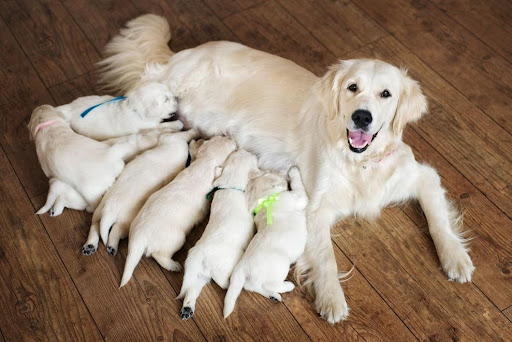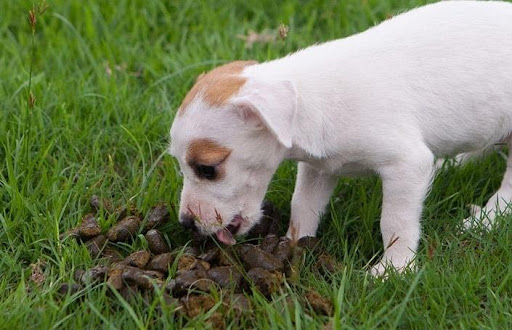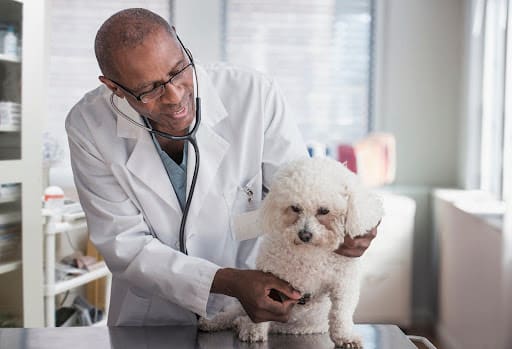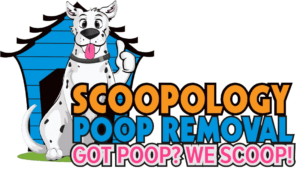How To Stop Dog From Eating Poop? Home Remedies!
Dogs eating poop, also known as coprophagia, is a behavior that leaves many pet owners puzzled, frustrated, and often a bit grossed out. While it’s not the most pleasant subject to discuss, understanding why dogs engage in this behavior and how to stop it is crucial for maintaining their health and your peace of mind. In this comprehensive guide, we’ll explore the reasons behind coprophagia, discuss how to stop a dog from eating poop home remedies, and provide actionable tips to help your dog kick the habit.

Why Do Dogs Eat Poop?
Before diving into solutions, it’s essential to understand why dogs eat poop. Several factors contribute to this behavior, ranging from instinctual tendencies to medical issues.
1. Instinctual Behavior
For some dogs, especially nursing females, eating poop is a natural behavior. Nursing mothers often consume the feces of their young to keep the den clean and reduce the scent that could attract predators. This behavior is not a cause for concern and usually diminishes once the puppies are weaned.
2. Nutritional Deficiencies
Dogs may eat feces due to a lack of essential nutrients in their diet. If a dog’s diet is lacking in nutrients like vitamins, minerals, or digestive enzymes, they may instinctively seek out feces to supplement their nutritional intake. Ensuring your dog’s food is of high quality can help prevent this behavior.
3. Curiosity and Exploration
Puppies are naturally curious and explore their environment using their mouths. This exploration can sometimes lead them to taste feces. While this behavior is generally harmless, it’s essential to discourage it early on to prevent it from becoming a habit.
4. Hunger and Malnutrition
If a dog is not fed enough or is on a low-quality diet, they may eat feces out of hunger or to make up for missing nutrients. Inadequate feeding practices can lead to coprophagia as the dog attempts to satisfy their nutritional needs. Ensuring your dog is properly fed with a balanced diet is crucial in preventing poop eating.
5. Behavioral Issues
Dogs may also eat feces due to behavioral reasons such as boredom, anxiety, or attention-seeking. For example, a dog left alone for long periods or not given enough mental stimulation may eat poop as a way to pass the time or to get a reaction from their owner. Understanding these behavioral reasons can help in implementing the right strategies to stop the behavior.
6. Parasites and Medical Conditions
Intestinal parasites can lead to nutrient deficiencies, causing a dog to eat feces. Additionally, medical conditions like endocrine pancreatic insufficiency (EPI), where the pancreas doesn’t produce enough digestive enzymes, can lead to coprophagia. In such cases, the dog is unable to properly digest and absorb nutrients, leading to a constant feeling of hunger and the instinct to eat feces.
Home Remedies to Stop Your Dog from Eating Poop
While there are commercial products available to deter dogs from eating feces, several home remedies can be effective in curbing this behavior. Below are some tried-and-tested methods to prevent dogs from eating poop.
1. Improve Their Diet
A well-balanced diet is crucial in preventing coprophagia. Ensure your dog is receiving the right amount of high-quality food rich in nutrients. Look for foods that list a protein source as the first ingredient, and avoid those with fillers like corn, wheat, or by-products.
Add Digestive Enzymes
Supplementing your dog’s diet with digestive enzymes can help improve nutrient absorption, reducing their need to seek out feces. These enzymes can be added to their food as a powder or capsule, promoting better digestion and overall health.
Probiotics
Adding probiotics to your dog’s diet can improve their gut health and reduce the likelihood of coprophagia. Probiotics promote a healthy balance of bacteria in the digestive system, aiding in better nutrient absorption. This can be an effective natural home remedy to prevent stool eating in dogs.
2. Taste Aversion Techniques
One way to deter your dog from eating feces is to make it taste unappealing. This can be done by adding certain substances to their food that will make their feces taste bad.
Natural Additives
Certain natural ingredients can be added to your dog’s food to make their poop taste unpleasant. These include:
- Pineapple: Adding small amounts of pineapple to your dog’s diet can make their feces taste bad, deterring them from eating it.
- Pumpkin: Pumpkin is a fiber-rich food that can improve digestion and make feces less appealing to dogs.
- Papaya: Like pineapple, papaya contains enzymes that can make feces taste unappetizing to dogs.
These natural remedies can help prevent dogs from eating feces by making the stool less appealing to them.
Commercial Taste Deterrents
There are also commercial products available that can be added to your dog’s food to deter poop eating. These products typically contain ingredients like monosodium glutamate, chamomile, or pepper-plant derivatives, which make feces taste bad. Using these deterrents can be an effective strategy to stop dogs from eating poop.
3. Training and Behavior Modification
Training your dog to stop eating poop is an essential part of addressing coprophagia. Consistency and positive reinforcement are key in modifying this behavior.
“Leave It” Command
Teach your dog the “leave it” command to discourage them from eating feces. Start by using the command in a controlled environment with treats, and gradually introduce it during walks or in the yard where poop might be present. This command is particularly effective in preventing stool eating in dogs.
Positive Reinforcement
Reward your dog for not eating feces. When your dog poops and doesn’t try to eat it, immediately reward them with a treat or praise. This positive reinforcement will help them associate not eating poop with a reward.
Distraction Techniques
When you notice your dog approaching feces, distract them with a toy or a game. Engage them in a different activity to shift their focus away from the poop.
Clean Up Immediately
One of the most effective ways to prevent poop eating is to remove the temptation. Clean up your dog’s feces immediately after they go to the bathroom. This eliminates the opportunity for them to eat it, which is crucial in stopping this behavior.
4. Increase Mental and Physical Stimulation
Boredom is a common cause of coprophagia in dogs. Ensuring your dog is mentally and physically stimulated can help reduce this behavior.
Interactive Toys
Provide your dog with interactive toys that keep them engaged and mentally stimulated. Puzzle toys, treat-dispensing toys, and chew toys can keep your dog occupied and reduce boredom-related poop eating.
Exercise
Regular exercise is crucial for a dog’s mental and physical health. Ensure your dog is getting enough exercise to burn off energy and reduce boredom. Exercise can be an effective remedy to stop dogs from eating feces.
Training Sessions
Incorporate regular training sessions into your dog’s routine. This not only reinforces good behavior but also provides mental stimulation that can reduce the likelihood of coprophagia.
5. Address Underlying Medical Issues
If your dog’s coprophagia is due to a medical condition, it’s essential to address the root cause.
Visit the Veterinarian
If your dog is eating poop and you suspect it may be due to a medical issue, schedule a visit to the veterinarian. The vet can conduct tests to check for conditions like intestinal parasites or endocrine pancreatic insufficiency (EPI) and recommend appropriate treatment.
Medication
If your dog has a medical condition that leads to coprophagia, your vet may prescribe medication to treat the underlying issue. For example, if your dog has EPI, they may need enzyme supplements to aid in digestion. Addressing these medical issues is crucial in stopping dogs from eating feces.

Professional Help and Consultation
If home remedies and training techniques don’t seem to work, consulting with a professional may be necessary. A veterinarian or a dog behaviorist can provide tailored advice and strategies to help your dog stop eating poop.
Veterinary Consultation
If your dog’s coprophagia persists despite trying various remedies, it’s crucial to consult with a veterinarian. They can rule out any underlying health issues and recommend appropriate treatments or dietary changes.
Dog Behaviorist
In cases where coprophagia is due to behavioral issues, a dog behaviorist can help. They can assess your dog’s behavior, identify triggers, and develop a customized training plan to address the issue.
Coprophagia in Puppies
Puppies are particularly prone to coprophagia due to their curiosity and natural behavior. However, this behavior can often be outgrown with proper training and care.
Supervision
Supervise your puppy closely, especially during potty breaks. Immediate redirection can prevent them from developing a habit of eating feces.
Consistent Feeding Schedule
Maintaining a consistent feeding schedule can help regulate your puppy’s digestion and reduce the chance of them eating poop.
Crate Training
Crate training can help in managing your puppy’s potty breaks and prevent access to feces when unsupervised.
Preventing Coprophagia in Multi-Dog Households
If you have more than one dog, preventing coprophagia can be more challenging. Dogs may eat each other’s feces, making it essential to take extra precautions.
Monitor Interactions
Closely monitor your dogs during and after potty breaks to prevent them from eating each other’s feces.
Feed Dogs Separately
Feeding your dogs separately can help prevent any food-related aggression or competition that may lead to coprophagia.
Treat All Dogs
If you’re using taste deterrents or supplements to prevent coprophagia, make sure to treat all dogs in the household. This ensures that no feces will be appealing to any of the dogs. By treating all dogs, you reduce the risk of one dog eating another’s feces, which is particularly important in multi-dog households.
Contact Information
If after trying all the above consult with a veterinarian about possible underlying issues. The following are some recommendations (tell them Scoopology recommended them):
- Grays Harbor: Raintree Veterinary Center, Blue Cross Veterinary Clinic, Brady Veterinary Hospital
- Thurston County: Healthy Pets Animal Hospital and Deschutes Animal Clinic
- Kitsap County: Kitsap Veterinary Hospital
- Mason County: Shelton Veterinary Hospital
- Pierce County: Farris Veterinary Clinic and University Place Veterinary Hospital
- King County: McMonigle Veterinary Hospital, Lake Union Veterinary Clinic, A Valley Animal Hospital

At Scoopology, we understand that dealing with your dog’s poop-eating habits can be frustrating and challenging. That’s why we offer professional pet waste removal services to help keep your yard clean and reduce the temptation for your dog to engage in coprophagia. Our team of experienced scoopologists is dedicated to providing you with a cleaner, safer environment for your pets.
Whether you need a one-time cleanup or regular service, Scoopology has you covered. Our services are designed to be flexible and convenient, fitting into your busy schedule. By removing feces promptly and regularly, you can reduce your dog’s access to this unhealthy habit, supporting the other methods you use to curb their behavior.
For more information or to schedule a service, please contact us today. Our friendly team is here to answer any questions you may have and help you find the right solution for your needs. Let Scoopology take care of the dirty work so you can focus on what matters most—enjoying quality time with your beloved pets.

